Pascal Bugnion - Scala:Applied Machine Learning
Here you can read online Pascal Bugnion - Scala:Applied Machine Learning full text of the book (entire story) in english for free. Download pdf and epub, get meaning, cover and reviews about this ebook. year: 2017, publisher: Packt Publishing, genre: Computer. Description of the work, (preface) as well as reviews are available. Best literature library LitArk.com created for fans of good reading and offers a wide selection of genres:
Romance novel
Science fiction
Adventure
Detective
Science
History
Home and family
Prose
Art
Politics
Computer
Non-fiction
Religion
Business
Children
Humor
Choose a favorite category and find really read worthwhile books. Enjoy immersion in the world of imagination, feel the emotions of the characters or learn something new for yourself, make an fascinating discovery.
- Book:Scala:Applied Machine Learning
- Author:
- Publisher:Packt Publishing
- Genre:
- Year:2017
- Rating:5 / 5
- Favourites:Add to favourites
- Your mark:
Scala:Applied Machine Learning: summary, description and annotation
We offer to read an annotation, description, summary or preface (depends on what the author of the book "Scala:Applied Machine Learning" wrote himself). If you haven't found the necessary information about the book — write in the comments, we will try to find it.
Leverage the power of Scala and master the art of building, improving, and validating scalable machine learning and AI applications using Scalas most advanced and finest features
About This Book- Build functional, type-safe routines to interact with relational and NoSQL databases with the help of the tutorials and examples provided
- Leverage your expertise in Scala programming to create and customize your own scalable machine learning algorithms
- Experiment with different techniques; evaluate their benefits and limitations using real-world financial applications
- Get to know the best practices to incorporate new Big Data machine learning in your data-driven enterprise and gain future scalability and maintainability
This Learning Path is for engineers and scientists who are familiar with Scala and want to learn how to create, validate, and apply machine learning algorithms. It will also benefit software developers with a background in Scala programming who want to apply machine learning.
What You Will Learn- Create Scala web applications that couple with JavaScript libraries such as D3 to create compelling interactive visualizations
- Deploy scalable parallel applications using Apache Spark, loading data from HDFS or Hive
- Solve big data problems with Scala parallel collections, Akka actors, and Apache Spark clusters
- Apply key learning strategies to perform technical analysis of financial markets
- Understand the principles of supervised and unsupervised learning in machine learning
- Work with unstructured data and serialize it using Kryo, Protobuf, Avro, and AvroParquet
- Construct reliable and robust data pipelines and manage data in a data-driven enterprise
- Implement scalable model monitoring and alerts with Scala
This Learning Path aims to put the entire world of machine learning with Scala in front of you.
Scala for Data Science, the first module in this course, is a tutorial guide that provides tutorials on some of the most common Scala libraries for data science, allowing you to quickly get up to speed building data science and data engineering solutions.
The second course, Scala for Machine Learning guides you through the process of building AI applications with diagrams, formal mathematical notation, source code snippets, and useful tips. A review of the Akka framework and Apache Spark clusters concludes the tutorial.
The next module, Mastering Scala Machine Learning, is the final step in this course. It will take your knowledge to next level and help you use the knowledge to build advanced applications such as social media mining, intelligent news portals, and more. After a quick refresher on functional programming concepts using REPL, you will see some practical examples of setting up the development environment and tinkering with data. We will then explore working with Spark and MLlib using k-means and decision trees.
By the end of this course, you will be a master at Scala machine learning and have enough expertise to be able to build complex machine learning projects using Scala.
This Learning Path combines some of the best that Packt has to offer in one complete, curated package. It includes content from the following Packt products:
- Scala for Data Science, Pascal Bugnion
- Scala for Machine Learning, Patrick Nicolas
- Mastering Scala Machine Learning, Alex Kozlov
A tutorial with complete examples, this course will give you the tools to start building useful data engineering and data science solutions straightaway. This course provides practical examples from the field on how to correctly tackle data analysis problems, particularly for modern Big Data datasets.
Pascal Bugnion: author's other books
Who wrote Scala:Applied Machine Learning? Find out the surname, the name of the author of the book and a list of all author's works by series.

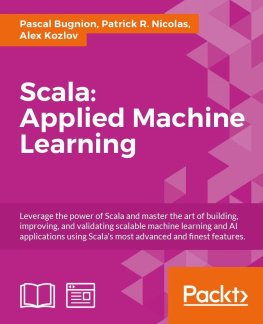
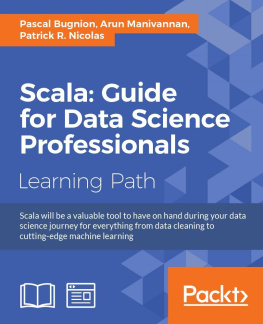

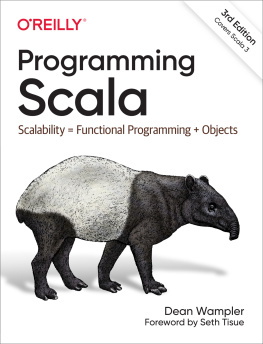
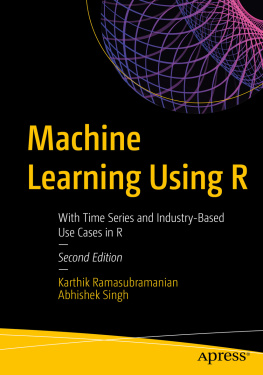
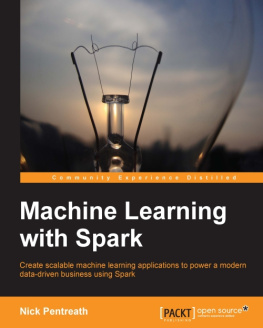
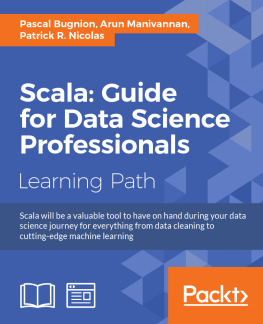
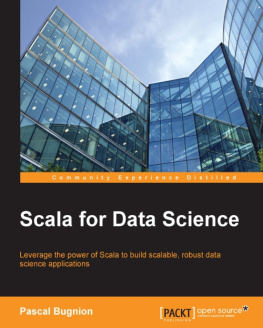
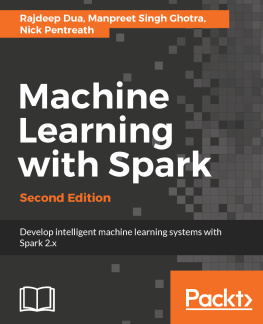
![Pascal Bugnion [Pascal Bugnion] - Scala for Data Science](/uploads/posts/book/119601/thumbs/pascal-bugnion-pascal-bugnion-scala-for-data.jpg)
